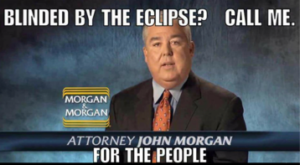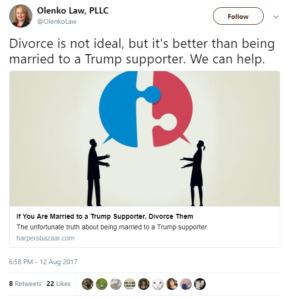“There were a bunch of kids all dressed up, the boys wearing power ties.” Are toddler birthday parties themed after personal injury lawyers becoming a thing? The latest case, from South Carolina, like one noted in 2015 from Louisiana, seem to have come into existence because the kids see and listen to injury lawyers’ ads and jingles on TV again and again (and again) and fix on them. Indeed, they may even begin to interpret the counselors as some species of superhero. “The report includes plenty of party pics as well as a three-minute highlight video, all provided by the office of George Sink, P.A., Injury Lawyers. Is it a marketing piece? Sure. But hey—the family asked him to come to the party, and he was a good sport about it. He’s entitled to a little credit for that, I think.” [Lowering the Bar; earlier 2015 on Louisiana case]
Posts Tagged ‘chasing clients’
Tasteful lawsuit ad Hall of Fame, cont’d
Lawsuit Cash Truck:
[via Alex Taylor and Bruce Golding, New York Post] Earlier exercises in tastefulness here.
Medical roundup
- In welcome reversal of Obama-era ban, FDA will once more permit direct-to-consumer genetic testing [Meghana Keshavan/STAT News, FDA press release]
- Will California law hold a pharmaceutical maker liable — in perpetuity — for a drug that it did not make and did not sell? [Steven Boranian/Drug & Device Law, PLF on T.H. v. Novartis]
- Litigation funding group chases clients in hip replacement litigation [PR Newswire]
- ACA penalizes hospitals for high Medicare readmission rates, but new study links that policy to higher mortality for heart failure patients [Arnold Kling, Ankur Gupta et al., JAMA Cardiology, Cristina Boccuti and Giselle Casillas, Kaiser Family Foundation]
- Litigation tourism model that has done well for plaintiff’s bar now circling drain after Supreme Court’s Bauman, Bristol-Myers Squibb decisions [Jim Beck, Drug & Device Law, more, yet more; related on West Virginia, and from Michelle Yeary on choice of law and forum non conveniens]
- “FDA Commissioner Scott Gottlieb Goes to Bat For Evidence-Based Opioid Policies” [Mike Riggs, Reason] “Abuse-Deterrent Opioids Cross an Ethical Line” [Jeffrey Singer, Orange County Register]
Liability roundup
- Hoping to blame Pacific Gas & Electric power lines for Northern California fires, lawyers from coast to coast descend on wine country [Paul Payne, Santa Rosa Press-Democrat]
- Courts should police lawyers’ handling of class actions, including temptation to sweep additional members with doubtful claims into class so as to boost fees [Ilya Shapiro, Trevor Burrus, and Reilly Stephens on Cato certiorari amicus in case of Yang v. Wortman]
- “Seventh Circuit Curtails RICO Application to Third-Party Payor Off-Label Suits” [Stephen McConnell, D&DL] “Here Is Why The False Claims Act Is An ‘Awkward Vehicle’ In Pharma Cases” [Steven Boranian]
- Litigation finance moves into car crash business [Denise Johnson, Insurance Journal]
- Slain NYC sanitation worker’s “frequent advice to Sanitation colleagues about how to save for the future helped persuade the jury that Frosch had a viable career ahead of him in financial planning,” contributing large future earnings component to $41 million award [Stephen Rex Brown, New York Daily News]
- “Ninth Circuit Overturns State Licensing Scheme Forcing Businesses to Incorporate in California” [Cory Andrews, WLF]
Liability roundup
- Multi-district litigation still a Wild West realm: “Lawyers for Civil Justice Urges Reform of MDL Procedures” [request for rulemaking via TortsProf] “Multidistrict Litigation Reform: The Case for Earlier Application of Federal Pleading Standards” [James Beck, WLF]
- Lawyer vs. lawyer: “Philadelphia Injury Firm Sues Morgan & Morgan for False Advertising” [P. J. D’Annunzio, The Legal Intelligencer]
- Trespasser injured climbing electrical tower loses suit against Metro-North railroad and utility [Robert Storace, Connecticut Law Tribune; Daniel Fisher, Legal NewsLine, earlier] “Ohl was walking along the train tracks with earbuds in on March 2”; family now suing CSX [Amanda C. Coyne, Atlanta Journal-Constitution]
- “The U.S. Supreme Court Reins in Discovery Sanctions” [Phil Goldberg and Kathryn Constance, IADC]
- Annual state lawsuit climate survey from U.S. Chamber is out; could be a “wake-up call” for Delaware, assumed to have pro-business courts [Zoe Read, Newsworks]
- Boom in third-party litigation finance continues apace [Longford Capital]
“Blinded by the Eclipse?”
Yes, really; it’s from the Facebook feed of Florida attorney and political hopeful John Morgan of Morgan & Morgan, who has featured in these columns on various occasions over the years. More eclipse-chasing from the firm’s website: “If you’re an eclipse viewer and you’re hurt on someone else’s property, you could have a claim, depending on the circumstance.” [George Bennett, Palm Beach Post]
P.S. According to this Space.com account of the turbulence found on the sun’s surface, “These pockets, or ‘bombs,’ eject plasma.” So that explains it. The sun has deep pockets! (And welcome Ray Dunaway show listeners.)
Great moments in lawyer marketing
This should qualify for some sort of prize for lawyer online marketing of questionable taste:
[original tweet, NYC-based Olenko Law Firm, linked Harper’s Bazaar article, my own Twitter response to latter]
Pharmaceutical roundup
- What if law firms advertising about drugs had to live with the same set of rules as drug firms advertising about drugs? [Beck, Drug and Device Law]
- Jury: no injury damages for testosterone-gel plaintiff, but lawyer got us upset at AbbVie so here’s $150 million anyway [Lisa Schencker, Chicago Tribune]
- “Plaintiff’s design defect claim was that the defendant shouldn’t have used ibuprofen at all, but rather [an alternative compound] even though the FDA has not approved [that compound] for sale in the United States.” That won’t fly even in California [Beck]
- Sky-high prices: “The pharmaceutical market is anything but free at present” [Marc Joffe, Reason]
- Opioids epidemic poses a policy challenge but no time to panic [Jeffrey Singer/Cato, related podcast, op-ed, panel; an ACA angle?]
- “Gene editing isn’t about designer babies, it’s about hope for people like me” [Alex Lee, Guardian]
Detroit Free Press investigates crash-claim abuse
“Detroit drivers face the highest average auto insurance rates in the country, often more than $3,000 a year for a single vehicle,” while residents of Michigan as a whole pay the third highest rates of any state. A Detroit Free Press investigation by J.C. Reindl and others “finds that runaway medical bills, disability benefits payouts and lawsuits under Michigan’s one-of-a-kind, no-fault insurance system play a key role in driving up costs.” One key difference: of the twelve states that mandate no-fault insurance, only Michigan provides for unlimited lifetime benefits.
Some findings from the series:
* “Ambulance chasing” and solicitation thrive notwithstanding laws intended to curb those practices. Despite privacy rules governing police reports and hospital admissions, for example, those involved in crashes are often solicited within hours, then signed up with law firms that later disavow any knowledge of solicitation. And how did an accident treatment clinic in suburban Detroit come to be owned by a California and Florida plastic surgeon noted for appearing on “The Real Housewives of Orange County” who seldom visited?
* While crashes in Wayne County (Detroit) declined from 72,227 to 50,548 between 2003 and 2015, “first-party” lawsuits — against one’s own insurance company for no-fault benefits — increased from 1,699 to 6,327 and negligence suits against other drivers from 2,527 to 3,435. Many “first-party” claims, of course, are paid without anyone filing suit, which is how no-fault law contemplated would be normal practice;
* Auto insurers have launched racketeering lawsuits aimed at proving forms of collusive fraud. Unlike many states, Michigan has no official watchdog charged primarily with combating auto claims fraud.
* “Defenders of the current system include the powerful Coalition Protecting Auto No-Fault, made up of trial lawyers, medical clinics, disability advocates and, until recently, the state’s hospital lobby.”
* Other states’ approaches to containing no-fault costs.
Privacy laws and client-chasing attorneys
Ohio’s FOIA/public records law guards the privacy of workers comp claimants, but with an exception for journalists. Lawyers hire journalist to dredge names. Legal? [John O’Brien, Legal NewsLine/Forbes] Lawyers have sued for direct access to the lists [ABA Journal]


